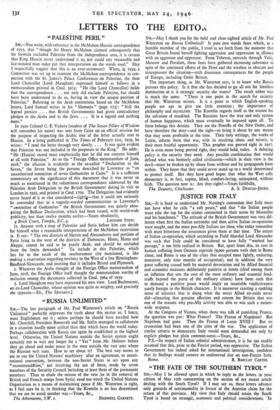LETTERS TO THE E.DITO.:
"PALESTINE PERIL"
Sra,—You write, with reference to the McMahon-Husain correspondence of 1915, that "though Sir Henry McMahon claimed subsequently that his formula excluded Palestine from the independence area, it is certain that King Husain never understood it so, nor could any reasonable and fair-minded man today put that interpretation on the words used." May I respectfully suggest that this is an over-statement? When, in 1939, a Committee was set up to examine the McMahon correspondence in con- nection with the St. James s Palace Conferences on Palestine, the then Lord Chancellor (Lord Maugham) expressed himself as follows in a
memorandum printed in Cmd. 5974: " (the Lord Chancellor) holds that the correspondence. . . not only did exclude Palestine, but should have been understood to do so, having in view the unique position of Palestine." Referring to the Arab contentions based on the McMahon letters, Lord Samuel writes in his " Memoirs " (page 173): "Still the legend persists . . . that British Governments had given contradictory pledges to the Arabs and to the Jews. . . . It is a legend and nothing mere."
In 1920 Colonel C. E. Vickery (readers of The Seven Pillars of Wisdom will remember his name) was sent from Cairo on an official mission for the purpose of inspecting the Arabic text of the letter actually sent to Husain. In a letter published in The Times of February 21st, 1939, he writes: "I read the letter through very slowly. . . . It was quite evident that Palestine was not included in the proposals to the King." He adds: 'He (Husain) stated most emphatically that he did not concern himself at all with Palestine." As to the "Foreign Office memorandum of June, 19,8," the allusion is evidently to the so-called "Declaration to the Seven," the Seven being the persons described by Lawrence as "an unauthorised committee of seven Gothamites in Cairo." It is a sufficient commentary on the significance of this document that it was never so much as mentioned in the voluminous correspondence addressed by the Palestine Arab Delegation to the British Government during its visit to London in 1922, and printed in Cmd. 1700. The Delegation had evidently never heard of it or else, considered—righdar—that it could not seriously be contended that in a vaguely-worded communication to Lawrence's " cenunittee of Gothamites " the British Government was quietly abro- gating the Balfour Declaration, which had been issued, with world-wide publicity, less than twelve months earlier.—Yours obediently,
[1. Anyone with a map of Palestine and Syria before him can decide for himself what a reasonable interpretation of the McMahon reservation is. It ran : "The two districts of Mersin and Alexandretta and portions of Syria lying to the west of the districts of Damascus, Horns, Hama and Aleppo, cannot be said to be purely Arab, and should be excluded from the limits demanded." To include in this Palestine, which lies far to the south of the southernmost city mentioned, is like making a reservation regarding territory to the West of a line Birmingham- Bradford-Newcastle, and insisting that it includes Bristol and Plymouth. 2. Whatever the Arabs thought of the Foreign Office memorandum of June, 1918, the Foreign Office itself thought the memorandum worthy of inclusion among the documents collected in Cmd. 5964 of 1939.
3. Lord Maugham may have expressed his own view. Lord Buckmaster, an ex-Lord Chancellor, whose opinion was quite as weighty, said precisely the opposite.—En., The Spectator.]


























 Previous page
Previous page